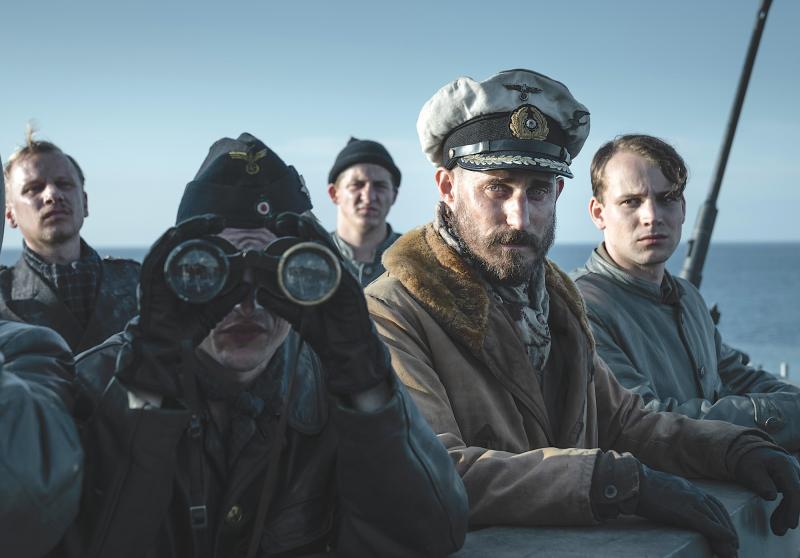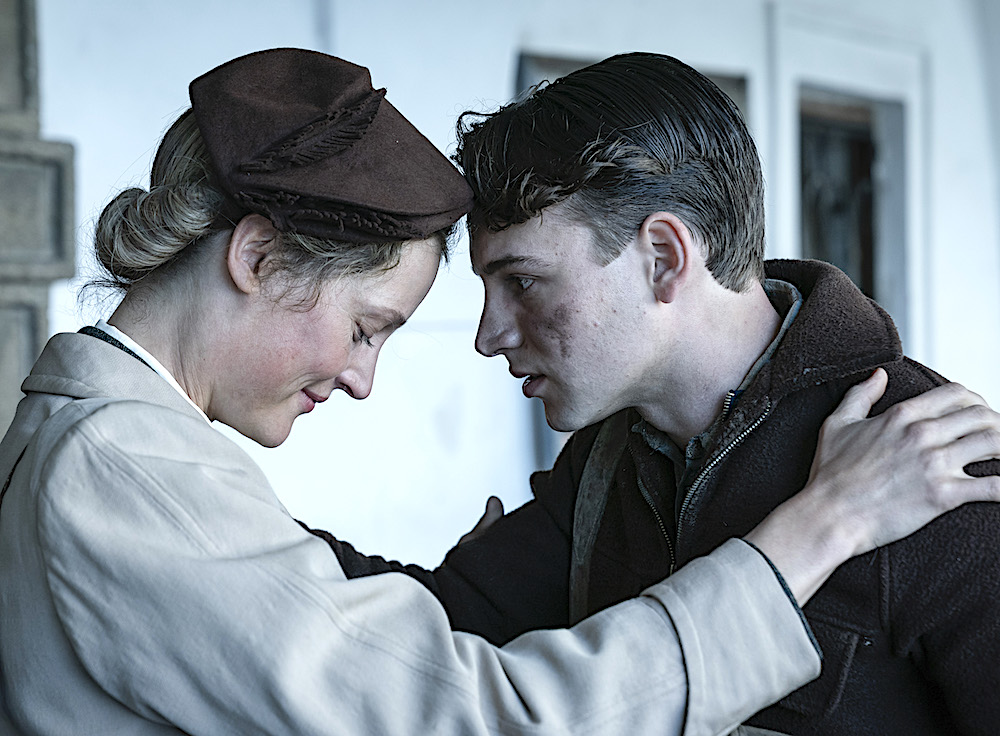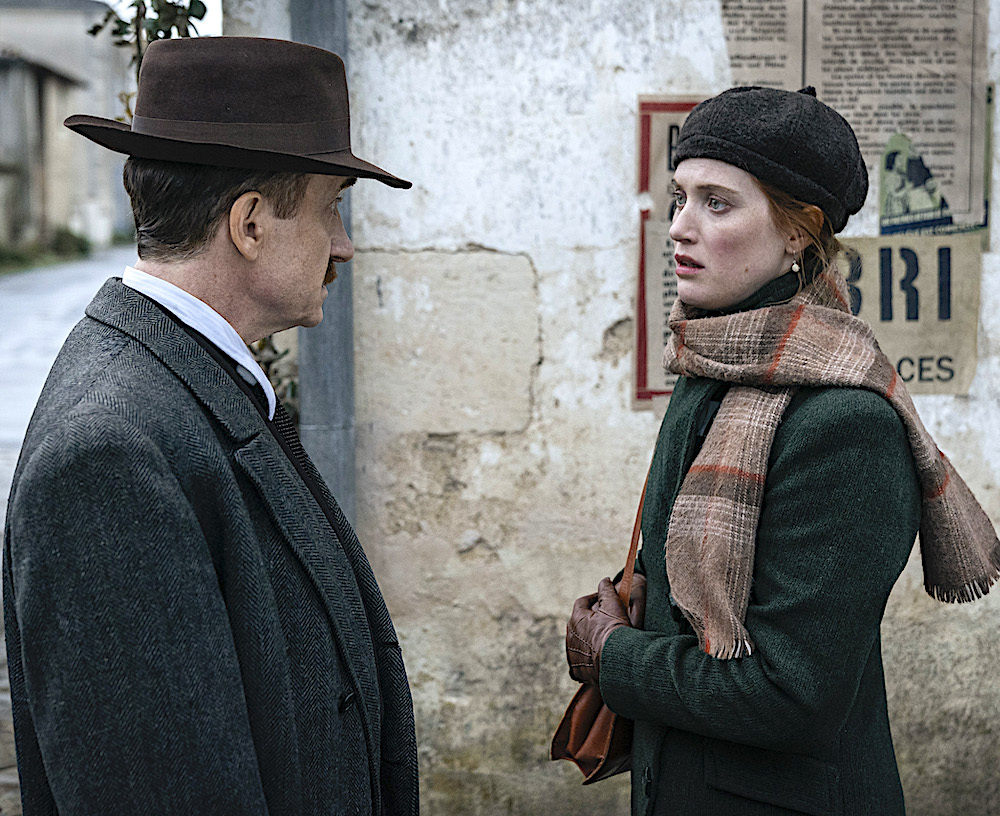Das Boot, Series 2, Sky Atlantic review - multi-layered war drama goes from strength to strength | reviews, news & interviews
Das Boot, Series 2, Sky Atlantic review - multi-layered war drama goes from strength to strength
Das Boot, Series 2, Sky Atlantic review - multi-layered war drama goes from strength to strength
Divided loyalties and moral dilemmas in the heart of Hitler's Reich

Das Boot made an impressive debut early last year with its entwined narratives of war by land and sea.
It opened with a bang, or a series of bangs, as we joined Johannes von Reinhartz (Clemens Schick), skippering his submarine U-822 in an attack on a merchant ship on a dark and turbulent Atlantic. As the ship sank, von Reinhartz was horrified to see women and children floundering in the water, but his unsentimental tactic of manoeuvring his boat beneath the survivors successfully deterred the enemy from dropping depth-charges. It made von Reinhartz the toast of La Rochelle.
 However, the German army is surrounded at Stalingrad, war-weariness is setting in, and murdering civilians intensifies the sickness in his soul. When he’s ordered to undertake a top-secret mission ferrying some SS officers across the Atlantic, von Reinhartz hatches a plan to abscond from the Kriegsmarine and hand himself over to the Americans, along with his vessel’s Enigma code machine.
However, the German army is surrounded at Stalingrad, war-weariness is setting in, and murdering civilians intensifies the sickness in his soul. When he’s ordered to undertake a top-secret mission ferrying some SS officers across the Atlantic, von Reinhartz hatches a plan to abscond from the Kriegsmarine and hand himself over to the Americans, along with his vessel’s Enigma code machine.
He thus joins the show’s other refuseniks and resistors. Simone Strasser (Vicky Krieps), who’s been working under the piercing eye of Gestapo chief Hagen Forster (Tom Wlaschiha) while helping to conceal a Jewish family, met a harrowing end when she fell into Forster’s cynical trap. Meanwhile her brother Frank (Leonard Scheicher, pictured above with Krieps) tried to desert from the navy to reunite with his baby daughter, but was saved from a firing squad by sympathetic old-school Commander Gluck (Rainer Bock), who assigned him to von Reinhartz’s crew.
What sets Das Boot apart from more run-of-the-mill war dramas is its satellite-vision scope and its fine-grained examination of the soul-destroying compromises of war. The depiction of daily life in La Rochelle, with German patrols routinely checking papers and citizens scurrying about their business with their eyes to the ground, communicates a pervasive sense of terror and mistrust. La Rochelle’s police chief Pierre Duval (Thierry Frémont, pictured below with Fleur Geffrier) must play the role of compliant underling to the Germans, but does his best to find ways to assist his countrymen when he can. However, he’s powerless to prevent Forster – who has an almost supernatural talent for finding weak spots and exploiting them – from assigning the low-life criminal Desjesquier as an auxiliary policeman tasked with hunting down Jews. Desjesquier is happy to torture fellow-Frenchmen to death in pursuit of his goal.
 It’s Forster, too, who proposes sending disgraced U-boat commander Wrangel (Stefan Konarske) to hunt down the rogue von Reinhartz, even though Gluck is fairly certain that Wrangel cast Captain Hoffmann (Rick Okon) adrift in mid-Atlantic and left him to die. Wrangel is a cold-blooded killer, but Forster sees him as a heroic poster-boy of the Reich.
It’s Forster, too, who proposes sending disgraced U-boat commander Wrangel (Stefan Konarske) to hunt down the rogue von Reinhartz, even though Gluck is fairly certain that Wrangel cast Captain Hoffmann (Rick Okon) adrift in mid-Atlantic and left him to die. Wrangel is a cold-blooded killer, but Forster sees him as a heroic poster-boy of the Reich.
But vile as the Nazis were, Das Boot reminds us that they had supporters in high places. In New York, where Hoffmann has, as it were, resurfaced, we learn more about the business tycoon Jack Greenwood’s partnership with the Third Reich and his aspirations for a seat in the US Senate. While New York discriminates against its black population, it teems with Nazi sympathisers, including the Irish-American cop who carries messages from the IRA. This is drama ranging far beyond the cramped and squalid interior of a U-boat.
rating
Explore topics
Share this article
The future of Arts Journalism
You can stop theartsdesk.com closing!
We urgently need financing to survive. Our fundraising drive has thus far raised £49,000 but we need to reach £100,000 or we will be forced to close. Please contribute here: https://gofund.me/c3f6033d
And if you can forward this information to anyone who might assist, we’d be grateful.

Subscribe to theartsdesk.com
Thank you for continuing to read our work on theartsdesk.com. For unlimited access to every article in its entirety, including our archive of more than 15,000 pieces, we're asking for £5 per month or £40 per year. We feel it's a very good deal, and hope you do too.
To take a subscription now simply click here.
And if you're looking for that extra gift for a friend or family member, why not treat them to a theartsdesk.com gift subscription?
more TV
 Murder Before Evensong, Acorn TV review - death comes to the picturesque village of Champton
The Rev Richard Coles's sleuthing cleric hits the screen
Murder Before Evensong, Acorn TV review - death comes to the picturesque village of Champton
The Rev Richard Coles's sleuthing cleric hits the screen
 Black Rabbit, Netflix review - grime and punishment in New York City
Jude Law and Jason Bateman tread the thin line between love and hate
Black Rabbit, Netflix review - grime and punishment in New York City
Jude Law and Jason Bateman tread the thin line between love and hate
 The Hack, ITV review - plodding anatomy of twin UK scandals
Jack Thorne's skill can't disguise the bagginess of his double-headed material
The Hack, ITV review - plodding anatomy of twin UK scandals
Jack Thorne's skill can't disguise the bagginess of his double-headed material
 Slow Horses, Series 5, Apple TV+ review - terror, trauma and impeccable comic timing
Jackson Lamb's band of MI5 misfits continues to fascinate and amuse
Slow Horses, Series 5, Apple TV+ review - terror, trauma and impeccable comic timing
Jackson Lamb's band of MI5 misfits continues to fascinate and amuse
 Coldwater, ITV1 review - horror and black comedy in the Highlands
Superb cast lights up David Ireland's cunning thriller
Coldwater, ITV1 review - horror and black comedy in the Highlands
Superb cast lights up David Ireland's cunning thriller
 Blu-ray: The Sweeney - Series One
Influential and entertaining 1970s police drama, handsomely restored
Blu-ray: The Sweeney - Series One
Influential and entertaining 1970s police drama, handsomely restored
 I Fought the Law, ITVX review - how an 800-year-old law was challenged and changed
Sheridan Smith's raw performance dominates ITV's new docudrama about injustice
I Fought the Law, ITVX review - how an 800-year-old law was challenged and changed
Sheridan Smith's raw performance dominates ITV's new docudrama about injustice
 The Paper, Sky Max review - a spinoff of the US Office worth waiting 20 years for
Perfectly judged recycling of the original's key elements, with a star turn at its heart
The Paper, Sky Max review - a spinoff of the US Office worth waiting 20 years for
Perfectly judged recycling of the original's key elements, with a star turn at its heart
 The Guest, BBC One review - be careful what you wish for
A terrific Eve Myles stars in addictive Welsh mystery
The Guest, BBC One review - be careful what you wish for
A terrific Eve Myles stars in addictive Welsh mystery
 theartsdesk Q&A: Suranne Jones on 'Hostage', power pants and politics
The star and producer talks about taking on the role of Prime Minister, wearing high heels and living in the public eye
theartsdesk Q&A: Suranne Jones on 'Hostage', power pants and politics
The star and producer talks about taking on the role of Prime Minister, wearing high heels and living in the public eye
 King & Conqueror, BBC One review - not many kicks in 1066
Turgid medieval drama leaves viewers in the dark
King & Conqueror, BBC One review - not many kicks in 1066
Turgid medieval drama leaves viewers in the dark
 Hostage, Netflix review - entente not-too-cordiale
Suranne Jones and Julie Delpy cross swords in confused political drama
Hostage, Netflix review - entente not-too-cordiale
Suranne Jones and Julie Delpy cross swords in confused political drama

Add comment